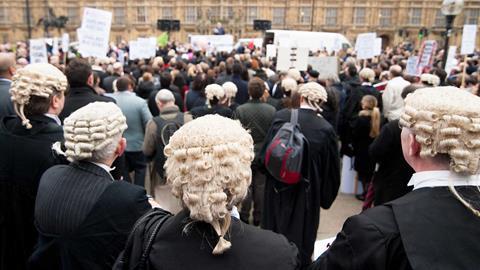The criminal justice system could slowly start to grind to a halt from 11 April if criminal barristers vote in favour of escalating action over the government’s failure to expedite its timetable for criminal legal aid reform.
Ballot papers issued by the Criminal Bar Association today ask members to choose between two options.
Option A would be to refuse all ‘returns’ under the advocates graduated fee scheme from 11 April unless the government agrees to a series of steps, including increasing remuneration under the AGFS by 25% per year for claims submitted on or after 11 April.
Option B is to take no action and wait for the government to publish its response to the independent criminal legal aid review, which is expected to happen in the week commencing 14 March, followed by a consultation until the end of June, and then any necessary statutory instruments being implemented by the end of September.
‘Returns’ cases are those taken on by criminal barristers as a gesture of goodwill to prop up the criminal justice system.
The independent review recommended that the advocates graduated fee scheme be increased by a minimum £35m (15%) a year. A proportion of this will remunerate solicitor-advocates who appear in the Crown courts.
CBA chair Jo Sidhu QC said: 'In reality, a 15% increase equates to no more than an extra £21m for those that practise full time at the criminal bar. It is therefore the firm view of the CBA executive and officers that the recommended minimum increase falls far short of what is required to enable criminal barristers to continue to practise in this important area of work. We anticipate that any efforts to increase fees through the AGFS will be matched by a corresponding increase in prosecution fees to retain parity between defence and prosecution work.'
Sidhu added: 'This is a critical moment in the history of our profession... It is for you to decide as individual and independent practitioners whether, by refusing to undertake return work, the criminal bar will be in a stronger position to persuade government to meet the fair and necessary demands we make as set out in option A of the ballot. We emphasise that each member must make their election freely and without pressure. As your representatives, we will continue to seek the best possible outcome for our profession whatever the result of this vote.'
The ballot will close at 11.59pm on Friday 11 March.




























10 Readers' comments